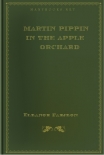Martin Pippin in the Apple Orchard by Eleanor Farjeon (top 10 novels to read .TXT) 📗

- Author: Eleanor Farjeon
Book online «Martin Pippin in the Apple Orchard by Eleanor Farjeon (top 10 novels to read .TXT) 📗». Author Eleanor Farjeon
"Would it be better not to open?" thought Helen. For then she would never know. Yes, then she could run to her millstones and fling them her thoughts in the husk, and listen, listen while they ground them into dreams. What knowledge would be better than that? What would she lose by opening the door?
But she had to open the door.
Outside on the stones stood a common lad. He might have been three years older than she. He had a cap with a hole in it in his hand, and a shabby jersey that left his brown neck bare. He was whistling when she lifted the bar, but he stopped as the door fell back, and gave Helen a quick and careless look.
"Can I have a bit of bread?" he asked.
Helen stared at him without answering. She was so unused to people that her mind had to be summoned from a world of ghosts before she could hear and utter real words. The boy waited for her to speak, but, as she did not, shrugged his shoulders and turned away whistling his tune.
Then she understood that he was going, and she ran after him quickly and touched his sleeve. He turned again, expecting her to speak; but she was still dumb.
"Thought better of it?" he said.
Helen said slowly, "Why did you ask me for bread?"
"Why?" He looked her up and down. "To mend my boots with, of course."
She looked at his boots.
"You silly thing," grinned the boy.
A faint color came under her skin. "I'm sorry for being stupid. I suppose you're hungry."
"As a hunter. But there's no call to trouble you. I'll be where I can get bread, and meat too, in forty minutes. Good-by, child."
"No," said Helen. "Please don't go. I'd like to give you some bread."
"Oh, all right," said the boy. "What frightened you? Did you think I was a scamp?"
"I wasn't frightened," said Helen.
"Don't tell me," mocked the boy. "You couldn't get a word out."
"I wasn't frightened."
"You thought I was a bad lot. You don't know I'm not one now."
Helen's eyes filled with tears. She turned away quickly. "I'll get you your bread," she said.
"You are a silly, aren't you?" said the boy as she disappeared.
Before long she came back with half a loaf in one hand, and something in the other which she kept behind her back.
"Thanks," said the boy, taking the bit of loaf. "What else have you got there?"
"It's something better than bread," said Helen slowly.
"Well, let's have a look at it."
She took her hand from behind her, and offered him seven ears of wheat. They were heavy with grain, and bowed on their ripe stems.
"Is this what you call better than bread?" he asked.
"It is better."
"Oh, all right. I sha'n't eat it though--not all at once."
"No," said Helen, "keep it till you're hungry. The grains go quite a long way when you're hungry."
"I'll eat one a year," said the boy, "and then they'll go so far they'll outlast me my lifetime."
"Yes," said Helen, "but the bread will be gone in forty minutes. And then you'll be where you can get meat."
"You funny thing," said the boy, puzzled because she never smiled.
"Where can you get meat?" she asked.
"In a boat, fishing for rabbits."
But she took no notice of the rabbits. She said eagerly, "A boat? are you going in a boat?"
"Yes."
"Are you a sailor?"
"You've hit it."
"You've seen the sea! you've been on the sea!--sailors do that..."
"Oh, dear no," said the boy, "we sail three times round the duckpond and come home for tea."
Helen hung her head. The boy put his hand up to his mouth and watched her over it.
"Well," he said presently, "I must get along to Pagham." He stuck the little sheaf of wheat through the hole in his cap, and it bobbed like a ruddy-gold plume over his ear. Then he felt in his pocket and after some fumbling got hold of what he wanted and pulled it out. "Here you are, child," he said, "and thank you again."
He put his present into her hand and swung off whistling. He turned once to wave to her, and the corn in his cap nodded with its weight and his light gait. She stood gazing till he was out of sight, and then she looked at what he had given her. It was a shell.
She had heard of shells, of course, but she had never seen one. Yet she knew this was no English shell. It was as large as the top of a teacup, but more oval than round. Over its surface, like pearl, rippled waves of sea-green and sea-blue, under a luster that was like golden moonlight on the ocean. She could not define or trace the waves of color; they flowed in and out of each other with interchangeable movement. One half of the outer rim, which was transparently thin and curled like the fantastic edge of a surf wave, was flecked with a faint play of rose and cream and silver, that melted imperceptibly into the moonlit sea. When she turned the shell over she found that she could not see its heart. The blue-green side of the shell curled under like a smooth billow, and then broke into a world of caves, and caves within caves, whose final secret she could not discover. But within and within the color grew deeper and deeper,





Comments (0)